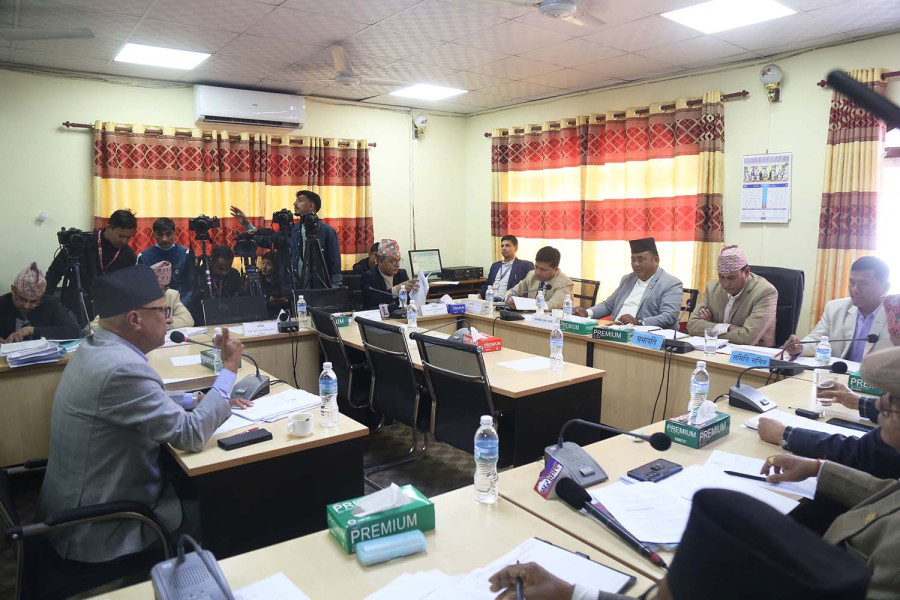National
Amid teachers’ protest, civil servants threaten to hit the streets seeking law
They have given the government a week’s time to table the Federal Civil Service Bill in Parliament.
Post Report
With school teachers on the streets for over two weeks, civil servants have also warned of stern protests if the Federal Civil Service Bill is not tabled in the House of Representatives by next week.
The representatives of the trade unions affiliated to six political parties, including the ruling CPN-UML and the Nepali Congress, submitted their 11-point demand to Ramhari Khatiwada, chair of the State Affairs and Good Governance Committee of the House of Representatives, demanding the law incorporating their concerns. They had picketed the House committee prior to submitting their demand paper.
The government employees’ representatives want the definition of civil servants to include all employees working at the federal, provincial and local levels. They also call for the establishment of a national-level trade union and an official trade union with authority for collective bargaining, in a manner that maintains an interrelationship between the federal, provincial and local levels.
“Except for the head of any office, all the civil servants up to the level of section officer or eighth level should be allowed to be members of a trade union,” reads another demand.
Civil servants are building pressure to accommodate their concerns in the bill as the Khatiwada-led committee has started final deliberations to streamline the bill. For non-gazetted officers, the unions want 70 percent of promotions through free competition, 20 percent inter-governmental and 10 percent based on experience. Similarly, they are in favour of promoting only 50 percent through open competition at the gazetted third class. The remaining 40 and 10 percent should be based on seniority and inter-governmental promotion respectively.
“For one time, all the civil servants including those who have already been integrated in different tiers of governments, should be allowed to choose under which government they want to work with,” reads another demand. Most of the civil servants don’t want to work under the local and provincial governments arguing they provide limited scope of growth.
Allowing all the contract and temporary staff to compete for permanent posting through internal competition irrespective of their age and including those from health and parliament services under civil service are their other demands. Receiving their demand paper, Khatiwada said he was ready to incorporate as many demands as the national resources could possibly implement.
“They have come down to 11 demands from over 80 last year which means most of them have been addressed,” Khatiwada told the Post. “They might have warned of protests as teachers are hitting the streets demanding better pay and perks. We will discuss their concerns during the deliberations.”
United under the Nepal Teachers’ Federation, thousands of teachers from across the country have gathered in Kathmandu for the past 16 days to pressure the government for a new law.
The six civil servants’ unions have given until April 24, a day before the budget session commences, to finalise and table the bill. President Ramchandra Paudel has summoned the new session of the federal parliament to begin on April 25.
The bill registered in the House of Representatives in March last year is under consideration of the House committee.
It’s nine years since the country adopted a federal democratic constitution, but the bureaucracy is yet to be run in line with the federal system in the absence of federal civil service law. The proposed law is supposed to work as an umbrella act setting standards for provincial and local governments to create provincial and local civil services.
If Khatiwada’s claim is anything to go by, his committee will table the bill latest by the end of this month. The committee hasn’t reached the conclusion whether to create an additional secretary’s position which is senior to joint-secretary and junior to secretary. While the ruling Congress party wants it, the prime minister’s CPN-UML and the main opposition CPN (Maoist Centre) have stood against it. “There is no point in reviving the Panchayat-era position,” said Hitraj Pandey, chief whip of the Maoist Centre.
Taking part in the deliberation, Chief Secretary Ek Narayan Aryal also said the practice of the additional secretary has been tested and failed in Nepal. “Is there any problem in bureaucracy without an additional secretary? It will increase the state’s cost,” he said.
However, Khatiwada says the additional secretary’s position will be needed as the bill will have just one secretary in one ministry. “The number of secretaries will come down to 50 from 69 now. Therefore, we need additional secretaries where secretaries cannot be deputed,” he said.
The committee also has not reached an agreement on the cooling period for civil servants to join other jobs after retirement or quitting the service. While parties are for having at least one year of cooling period, civil servants have stood against it.
“We are also yet to reach an agreement on trade union. We will find a way out after a couple of sittings,” said Khatiwada.




 16.16°C Kathmandu
16.16°C Kathmandu












